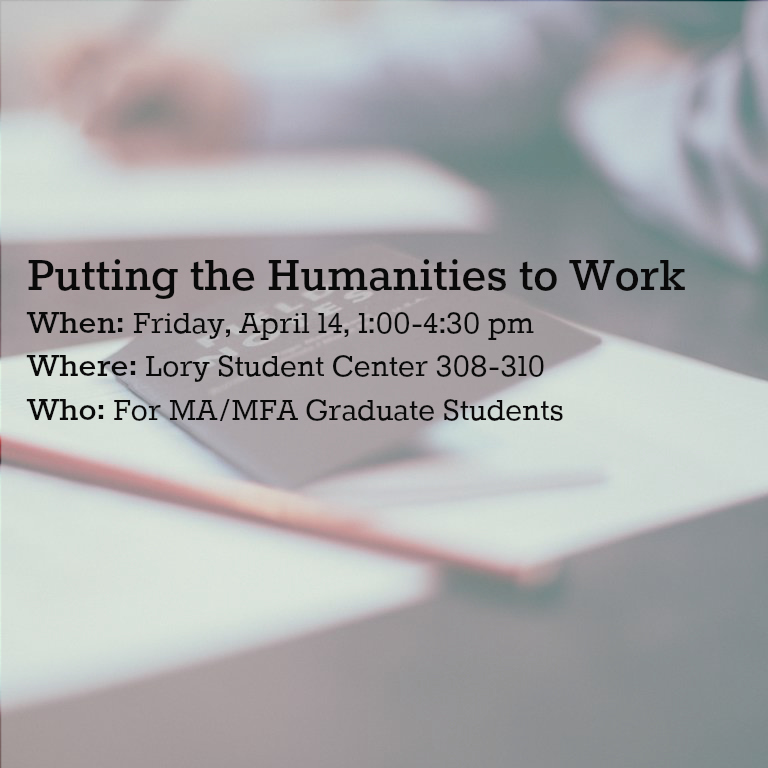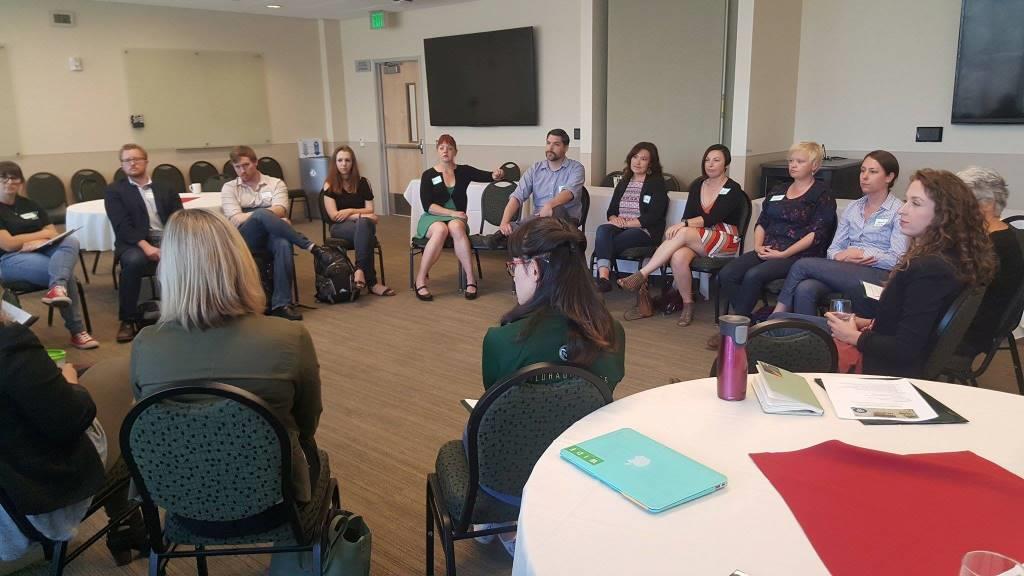~From intern Katie Haggstrom

Recently the English department hosted a workshop, “Putting the Humanities to Work,” to help graduate students explore potential career paths. As the event description explained, “one of the things we don’t talk enough about is how your English graduate degree prepares you for a wide range of interesting careers.” The common myth is that English majors have a narrow career choice, forced to decide between writing or teaching. But the field, and the career possibilities, have only expanded with the increasing need for people who can think critically, write, and communicate, and do so effectively.

Using LinkedIN Professionally
To begin the workshop, representatives from the CSU Career Center went over some of the features and networking tools available on LinkedIN. Katie Russo and Barbara Valusek stressed the importance of using the connections you already have, especially the ones made through CSU.
A LinkedIN profile is a virtual way to show companies the different qualifications and skill sets you have. However, around 56% of hiring managers report that LinkedIN profiles don’t share enough information on their job descriptions. Hiring managers do value information that goes beyond your education, like volunteer experience. So take advantage of the digital format to provide extra information you normally couldn’t include on your resume.
In addition to working as an online resume, LinkedIN is a great resource for reaching out to alumni and finding job postings. First, the Career Center suggests searching by specific university to find other alumni. From there, you can narrow searches depending on degree, areas of interests, and even location.
LinkedIN is also the perfect space for gathering connections, ranging from peers to coworkers and professors. Once you’ve found connections, or people you know on LinkedIN, take the extra step and see who your connections are connected to. Using that web of connections will ultimately expand your own connection base.
If you’re graduating or beginning the job search, use LinkedIN’s job section to let recruiters know that you’re looking for a job. Click the “Update career interests” to share information about what specific skills you have and what type of jobs you are interested in, building off the information already provided with your profile.
MA/MFA English Alumni Panel
What can you do with an english degree? What do you do if you don’t want to adjunct or be a professor?
The workshop ended with a 9 person alumni panel from various graduate CSU English graduate programs. The panel included:
- Whitney Dean, Owner/Head Coach, CrossFit Elevation
- Lauren Feldman, Associate Editor at Active Interest Media
- Shannon Dale, Assistant Director of Development, College of Liberal Arts, CSU
- Nelly O’Connor, Academic Success Coordinator, College of Liberal Arts, CSU
- Drew Nolte, partner at Agile League, application design/development
- Felicia Zamora, Program manager, CSU Online
- Jeana Steele Burton, Technical Writer, CA Technologies
- Angela Sharpe, INTO CSU Instructor, co-founder of Mas Language Services
- Shannon Zeller, INTO CSU Instructor, co-founder of Mas Language Services

This informal panel opened a discussion between current and graduated MA/MFA students with important and valuable tips for moving forward with our degrees. Some of the key points from this discussion were:
Experience. Many alumni placed emphasis on internship experience and making connections. Even join an interest group to find people in the community you can connect with.
Ask for help. Take advantage of the resources offered to you while you are a student, like your advisors, mentors, department and the Career Center. Don’t be afraid to ask any one of these people for help, they are here to help you succeed.
Continue learning. Teach yourself new skills before a job interview. If you’re unfamiliar with a position you’re looking at, research it! As English majors, we are talented at researching and learning about new things. Use that to your advantage.
Persistence. Apply for things that you might not feel qualified applying for. Don’t give up easily and keep pushing for the things you’re passionate about.
Networking. Come from a genuine place. Ask someone in your dream position out for coffee. Be authentic with those connections and show your curiosity. Create a mutual relationship and even offer them to help them with a project they’re working on. This will form a relationship with that person. (English majors can be fairly introverted people, so think about these opportunities as part of your professional identity, and mentally prepare for those interview and networking moments.)
“Huddle your ducks.” This builds off the idea of networking. Through the connections you make, create a strong well of people you can ask for help. This also means recommendations! Speak and engage with mentors and professors who have helped you during your education. These are great connections for the future.
Find your passion. Some members on the panel took a pay cut to move over into something they’re passionate about. Think about your direction and where you ultimately want to go.
Getting an MA/MFA in English might feel like a graduate degree with a narrow scope of employment, but. But there are many interesting, and unsuspected, ways to put that degree to use.
Ultimately, the most consistent piece of advice was to continue building a network. We all have a well of people around us who are focused in different areas and pursuing different things. Maintain relationships with these people and constantly watch for unconventional ways to use your English degree!